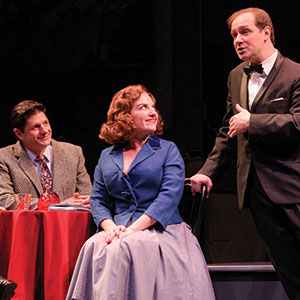

In Finks, playwright Joe Gilford imagines the lives of his showbiz parents, Madeline and Jack Gilford, at a crucial point in the beginning of their 40-year marriage. Their fictional counterparts are Mickey (Jim Stanek), a stand-up comedian, and Natalie (Donna Vivino), an actress and activist. They meet in a nightclub where Mickey’s performing. Natalie sees him and decides for the both of them that they’re meant for each other.
And despite the fact that they’re both attached to other people when they first meet, the drama of their romantic coupling is only the framing device for writer Gilford’s agenda.
Finks is set during the 1950s, when the House Un-American Activities Committee hearings dominated the headlines. Natalie belongs to an actors’ collective, a socialist one that supports unions and free speech. Some of the members were communist sympathizers or members of the communist party in the years that led up to World War II. She’s recruiting Mickey into her bed as much as she’s recruiting him for the cause. In one of their early exchanges, Natalie accounts for her activism by talking about her father’s profession, “My father was a pattern cutter in the Amalgamated. He worked in a factory so cold you had to boil the cloth before you could cut it.”
There’s a breeziness to this confession that neuters its emotional weight and import. Throughout the first act, Natalie and Mickey banter with each other rather than extract meaning from the dialogue they’ve been given. Giovanna Sardelli, the director, quickens the pace of every interaction, rushing the actors past their ability to connect or to convince the audience that they are connecting. Natalie is portrayed as a woman of voracious appetites who always gets what she wants. We see that Mickey falls in love with her because she tells him to, and not because we can feel the chemistry between them about to bubble over. They kiss and tell us how turned on they are, but the passion sounds false. They’re either trying too hard or talking in an overly stylized manner that’s meant to mimic the pacing of classic screwball comedies like Bringing Up Baby.
An American flag with 48 stars hangs at the center of the stage. Underneath it is the facsimile of a courtroom. The play’s narrative moves back and forth between Mickey and Natalie’s story in the foreground, set in living rooms and clubs, and the recessed courtroom where some of the artists who were blacklisted in Hollywood testify. We hear testimony from Lee J. Cobb, Budd Schulberg and Elia Kazan that’s been pulled from the hearings’ actual transcripts. But each time the action cuts away from Natalie and Mickey, the courtroom scenes foreshadow what’s coming for them in the second act with a very heavy gavel in hand.
Gilford’s courtroom scenes are built with an expectation that you’ve studied up on the Red Scare or rented Warren Beatty’s Reds (1981) or George Clooney’s Good Night, and Good Luck (2005). That you’ll know what each one of Natalie’s and Mickey’s friends has to lose if they’re subpoenaed. They could become finks by naming names or get blacklisted by not doing so. They could torch their reputations or careersor even end up in jail. As he’s written, Mickey is a compliant, accommodating boyfriend, then husband, to Natalie, and soon-to-be father of her children. The great conflict in Finks comes when the television network he’s about to work for threatens to cancel his show if he doesn’t testify.
Until that point, Stanek has performed Mickey’s Borscht Belt routines as an innocent, free of irony or any sense of contemporaneity. He’s come across as a light, comedic actor who must then embody a man engaged in a terrible conflict. But Finks invests more in nostalgia than it does in sturm und drang. There’s plenty of era-appropriate music, clothing and cultural references but nothing at stake when Mickey takes the stand. Of course, he’s going to do the right thing. From all the evidence in front of us, he would never be able to disregard Natalie’s sense of moral self-righteousness. Gilford says as much in an interview TheatreWorks Silicon Valley conducted with him:
“However, Mickey’s conflict about what he would actually do in the end is about the furthest I went to fictionalize for dramatic purposes. In real life, there was never any doubt as to my father’s intentions.”
Dramatized or not, in this production there was never any doubt as to Mickey’s intentions, either.
Finks
Thru Jul 1, $40+
Mountain View Center for the Performing Arts
theatreworks.org


